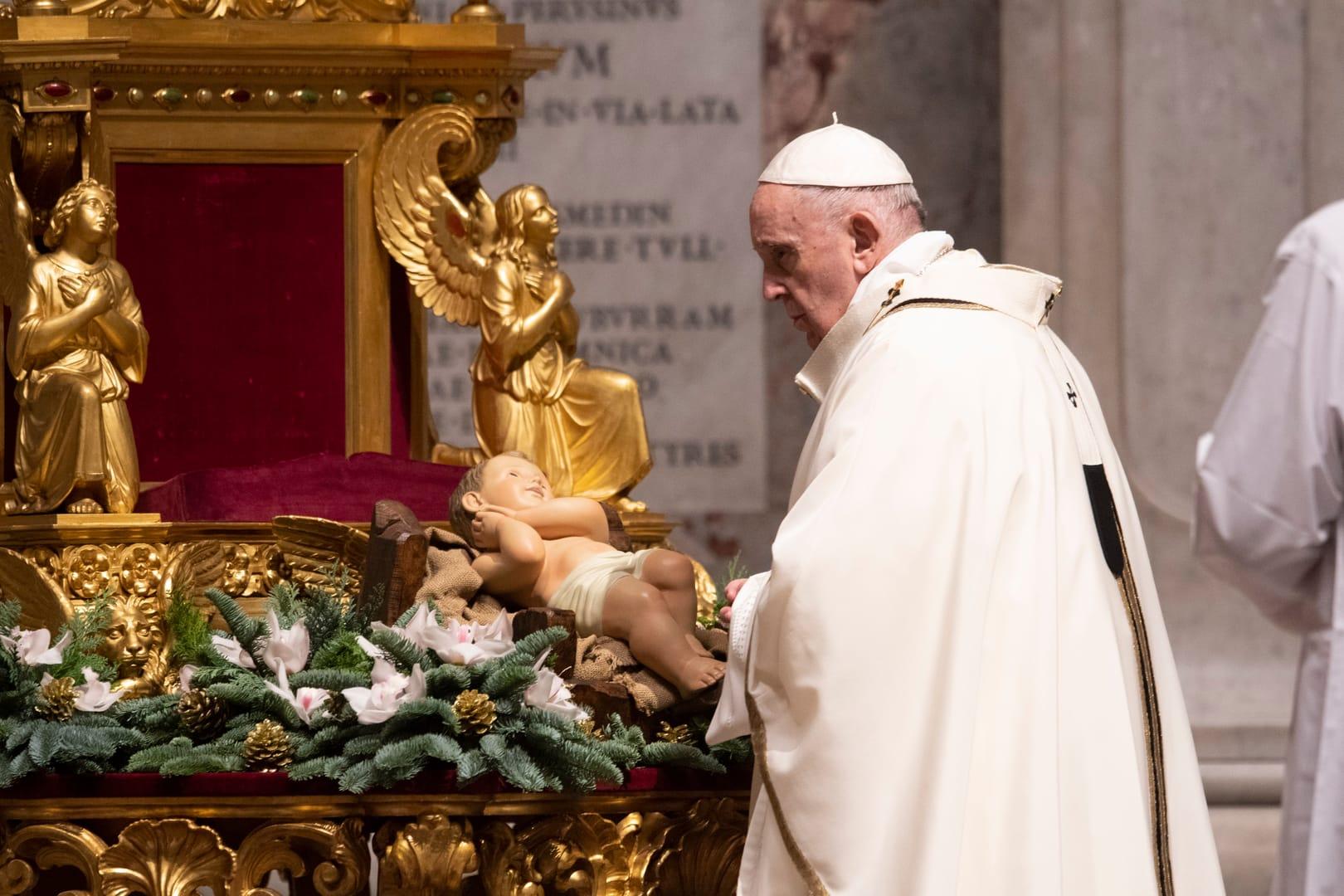ROME – In his homily for Christmas Eve Mass, Pope Francis said the heart of the feast commemorating Jesus’s birth is about poverty and learning to find God in the little things in life, rather than seeking power and success.
In this spirit, he again condemned indifference toward the poor and said Jesus specifically chose to be born close to the shepherds, the working men of their day, and called for dignified labor and an end to workplace fatalities.
Speaking to the roughly 1,500 people present inside St. Peter’s Basilica for the Dec. 24 Mass, the pope noted that the sign announced by the angels to the shepherds in the day’s Gospel was “a child, a baby lying in the dire poverty of a manger.”
“No more bright lights or choirs of angels. Only a child. Nothing else,” he said. “This is the message: God does not rise up in grandeur, but lowers himself into littleness.”
Friday’s Christmas Eve Mass had the most attendees at an indoor papal event since the beginning of the pandemic, despite a sharp rise in COVID cases in Italy related to the omicron variant.
Those present were distanced and wearing masks, as well as observing other safety and sanitary precautions. According to Vatican officials, attendees were not required to show a vaccine Green Pass to get in, despite a change in Vatican rules Thursday mandating all employees to get vaccinated in order to access their workplace and get paid.
In his homily, Pope Francis said the “scandalous” truth about Christmas is that Jesus chose to embody “littleness” in order to save the world.
“The One who embraces the universe needs to be held in another’s arms. The One who created the sun needs to be warmed. Tenderness incarnate needs to be coddled. Infinite love has a miniscule heart that beats softly…The Creator of the world has no home,” he said, adding, “Today, all is turned upside down.”
Christmas, he said, presents a challenge to believers to do things God’s way, which means choosing littleness rather than continuing to pursue success or “grandeur in the eyes of the world, perhaps even in his name.”
“This is what we should ask Jesus for at Christmas: The grace of littleness,” which is done by inviting God to be present in the small things of everyday life, whether it is at home, in the family, at work, or at school.
“If he is present there, what else do we need? Let us stop pining for a grandeur that is not ours to have. Let us put aside our complaints and our gloomy faces, and the greed that never satisfies!” Francis said.
To live this spirit, the pope said, also involves recognizing one’s own littleness “in our experience of feeling weak, frail, inadequate, perhaps even ‘messed up.’”
“If, as in Bethlehem, the darkness of night overwhelms you, if you feel surrounded by cold indifference, if the hurt you carry inside cries out, ‘You are of little account; you are worthless; you will never be loved the way you want,’ tonight God answers back. Tonight, he tells you: ‘I love you just as you are,’” the pope said.
Francis also urged believers to be close to the poor, saying that to recognize and embrace the littleness Jesus also means seeing and loving him “in the least of our brothers and sisters.”
“It is in them that he wants to be honored,” he said. “On this night of love, may we have only one fear: that of offending God’s love, hurting him by despising the poor with our indifference. Jesus loves them dearly, and one day they will welcome us to heaven.”
Jesus is surrounded by the poor at his birth, the pope said, and pointed to the figure of the shepherds, who were “the most simple people” and were only in the fields working that night “because they were poor.”
These shepherds “had no timetables in life; everything depended on the flock. They could not live where and how they wanted, but on the basis of the needs of the sheep they tended,” he said, adding, “That is where Jesus is born: close to them, close to the forgotten ones of the peripheries.”
Jesus chose to be born in a place where human dignity was tested, he said, saying God came “to ennoble the excluded and he first reveals himself to them: not to educated and important people, but to poor working people.”
“God tonight comes to fill with dignity the austerity of labor,” he said, and stressed the importance of allowing men and women to find dignity through labor.
He also called for an end to workplace fatalities, saying, “On the day of Life, let us repeat: No more deaths in the workplace! And let us commit ourselves to ensuring this.”
Workplace safety has been a concern in Italy, where three workers were killed and at least three bystanders were injured when a construction crane collapsed in Turin.
Pope Francis then pointed to the image of the three Magi, or wisemen, who offered gifts to the infant Jesus in Bethlehem, saying Jesus is the place where “everything comes together.”
“Not only do we see the poor, the shepherds, but also the learned and the rich, the Magi…Everything is unified when Jesus is at the center: not our ideas about Jesus, but Jesus himself, the living one,” he said.
Francis closed his homily encouraging believers to go back “to the essentials of the faith,” and to move “as a synodal Church” toward the small child in Bethlehem.
“There the Lord takes first place and is worshipped; there the poor have the place nearest him; there the shepherds and Magi are joined in a fraternity beyond all labels and classifications,” he said, adding, “May God enable us to be a worshipping, poor and fraternal Church. That is what is essential.”
Follow Elise Ann Allen on Twitter: @eliseannallen










